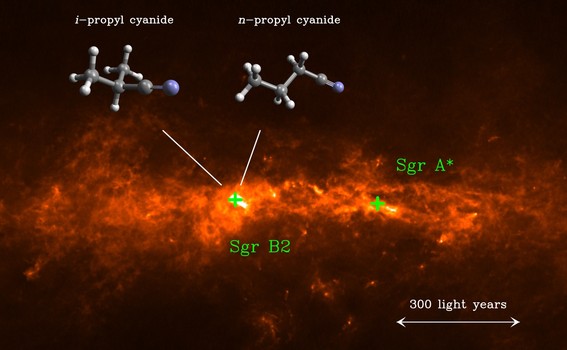Isopropyl cyanide has been discovered in the giant gas cloud called Sagittarius B2. Arnaud Belloche from the Max Planck Institute for Radio Astronomy and colleagues used the Atacama Large Millimeter Array (ALMA), a group of radio telescopes in Chile, to find the first evidence of branched-chain carbon compounds in interstellar space.
All of the previously discovered carbon-containing compounds found in space have been straight- chain molecules. The gas cloud called Sagittarius B2 is a region of ongoing star formation 27,000 light years from Earth where carbon-containing molecules can be created. The molecules are detected by the defined infrared and ultraviolet spectra that are emitted by the molecules.
The study found that more isopropyl cyanide existed in Sagittarius B2 than n-propyl cyanide. The same group found n-propyl cyanide in the Sagittarius B2 cloud using the single-dish radio telescope of the Institut de Radioastronomie Millimétrique. This discovery leads the astrophysicists and spectroscopists to propose that branched-chain molecules should be found in greater abundance in other active areas of star formation. High energy in active star forming regions would lead to an energy preference for complex structures.
Scientists have found 180 different carbon-containing molecules in space in the last 54 years. No amino acids have been found to date. A number of molecules that could be combined to produce simple amino acids have been discovered. The new discovery lends more credence to the concept that the basic units of life on Earth began in star forming gas clouds.















